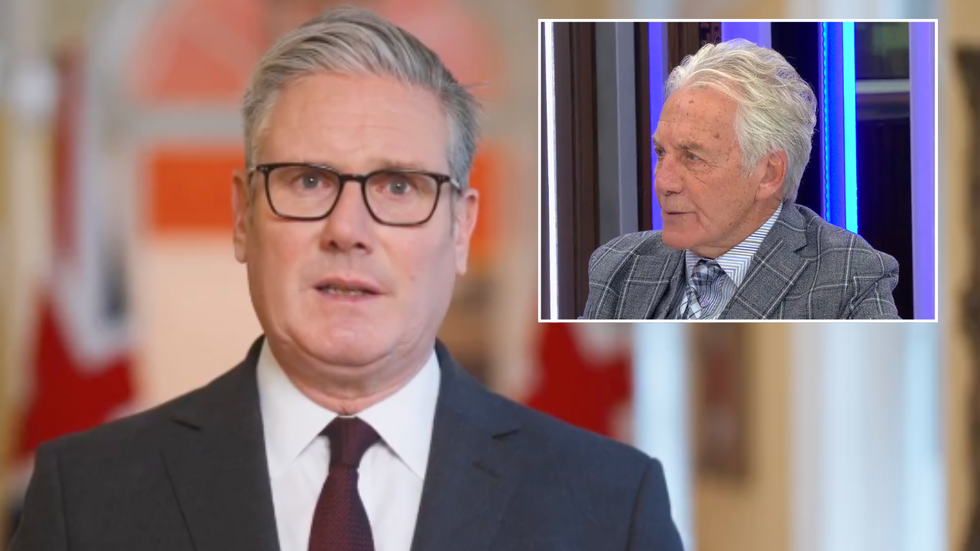A prominent businessman has launched a scathing attack on the Prime Minister following Britain’s historic decision to recognise Palestinian statehood.
Jeff Banks, speaking on GB News, accused Keir Starmer of “flip-flopping like a wet kipper on the fishmonger’s slab” over Middle Eastern policy.
The criticism came hours after Sir Keir announced on Sunday that the UK would formally recognise the State of Palestine, joining more than 150 nations in a move intended to preserve prospects for peace between Israelis and Palestinians.
Mr Banks argued that the Prime Minister’s decision represented inconsistent leadership on Israel-Palestine matters.

His comments reflected broader opposition to the recognition, which Israeli Prime Minister Benjamin Netanyahu had earlier described as “absurd” and tantamount to “a reward for terrorism”.
Mr Banks challenged the legitimacy of Palestinian statehood by presenting his interpretation of historical events.
LATEST DEVELOPMENTS
- Keir Starmer uses social media video to recognise Palestine as he hides from journalists’ questions
- Starmer’s recognition of Palestine makes Gaza more dangerous. Dominoes will fall – Philip Lester
- POLL: Should the UK have recognised the state of Palestine?
He maintained that Britain had administered the territory that Palestinians had previously inhabited, with an understanding that British control would end in 1947 following World War Two.
“Israel became the State of Israel. There is no state of Palestine,” Mr Banks declared during his GB News appearance.

The businessman outlined his view of subsequent territorial changes, referencing the 1967 conflict when Egypt and Jordan engaged in warfare against Israel, which Israel won.
He stated that Egypt subsequently withdrew from Gaza whilst Jordan departed the West Bank.
According to Mr Banks, Israel assumed administrative control over these territories. He noted that Israeli forces withdrew from Gaza and the West Bank in 2005, permitting Palestinians to govern themselves under what he termed a “licence” arrangement.
Banks defended Israel’s military response following the events of October 7, when he said mercenaries killed more than 1,000 individuals and seized over 250 hostages, whilst committing acts of murder and rape against children.

To illustrate the severity, Banks drew a comparison to a hypothetical scenario in Britain. “Put it into context, if we had 6,000 terrorists turn up at Glastonbury and do the same thing, there would be outrage. We would have reciprocated in kind,” he stated.
The businessman characterised the current situation as Israel waging war against Hamas, acknowledging that Palestinian civilians had become entangled in the conflict. He described this civilian involvement as “unfortunate” but appeared to frame it as an inevitable consequence of Hamas’s actions.
Mr Banks expressed deep scepticism about the possibility of meaningful negotiations with Hamas, which he described as a terrorist organisation that had controlled Gaza since winning elections in 2005. He asserted that Hamas could not be trusted as a negotiating partner.
The businessman highlighted the dire fate of Israeli hostages, stating that “at best, 26 are still alive” from those captured. He pointed to Hamas’s financial backing from Iran and Qatar as evidence of the group’s terrorist connections.
Mr Banks argued that genuine discussions could not occur whilst conflict continued. “Until that war is finally prosecuted by Netanyahu, it’s impossible to sit down and have a realistic discussion,” he said, suggesting that military action must conclude before any diplomatic progress could be achieved.
He concluded his critique by attributing political motivations to Sir Keir’s recognition of Palestinian statehood. Mr Banks accused the Prime Minister of “whistling to the wind and playing to the gallery” rather than pursuing genuine diplomatic solutions.
The businessman claimed that internal Labour Party dynamics drove the decision. “He’s doing it because of wokeism in Labour and playing to the Muslim vote,” Banks stated, suggesting that ideological pressures within the party and electoral considerations had influenced Starmer’s announcement.
This accusation came despite Starmer’s efforts to balance his position, including his description of Hamas as a “brutal terror organisation” and his pledge to increase sanctions against the group whilst demanding hostage releases and an immediate ceasefire.
Our Standards: The GB News Editorial Charter







Follow